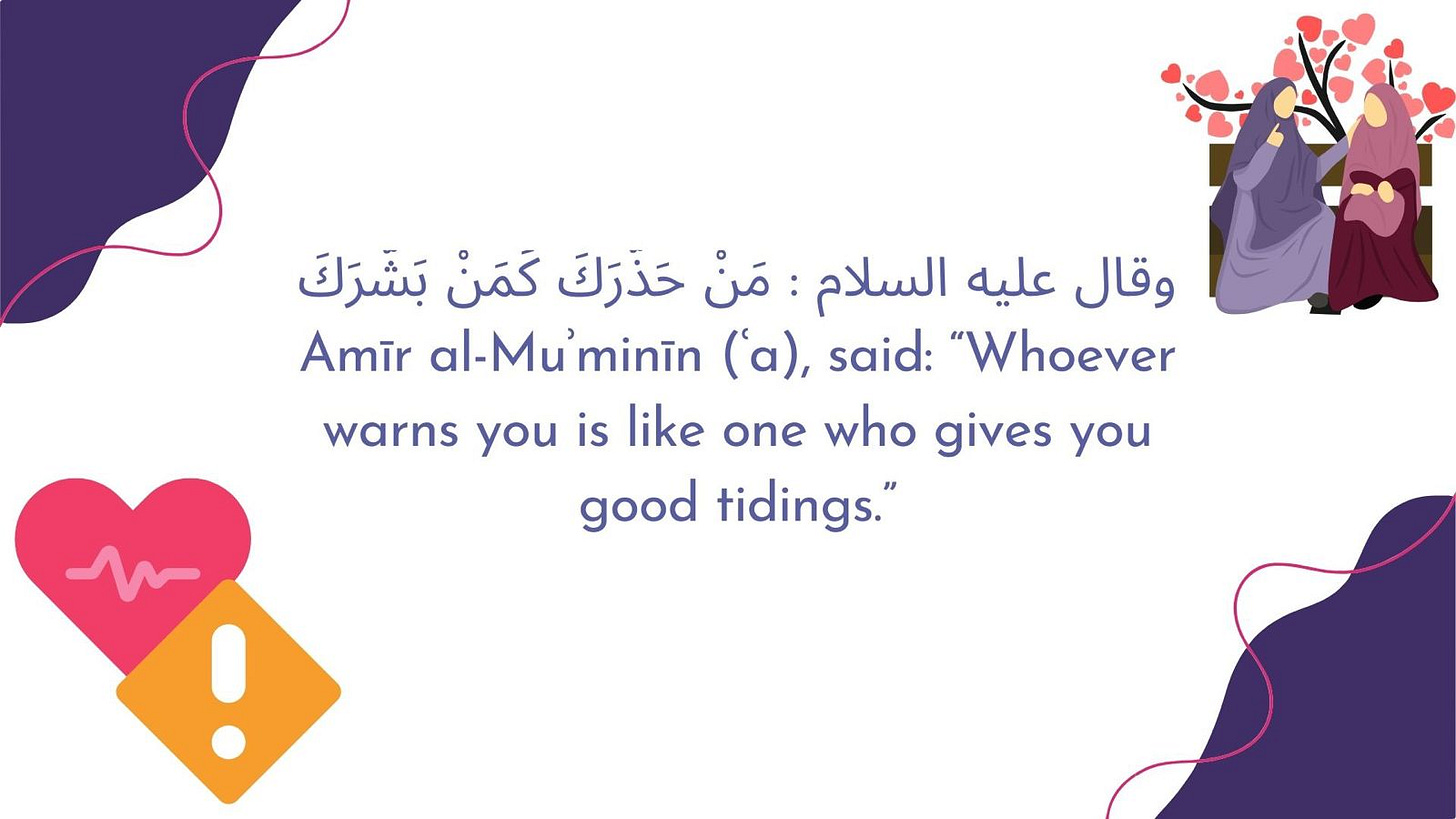﷽
(I begin) In the Name of Allah, the All-Kind (or All-Beneficent), the All-Merciful (or All-Compassionate)
مَنْ حَذَّرَكَ كَمَنْ بَشَّرَكَ
"Whoever warns you is like one who gives you good tidings"
Imām ʿAlī (ʿa), in this concise and profound statement, highlights the invaluable role of those who warn us about dangers and guide us towards rectification. At first, being warned can feel uncomfortable. No one enjoys being corrected or told they are heading toward danger. But Imām ʿAlī (ʿa) flips our perspective: we should welcome such warnings as we would welcome glad tidings, for both are acts of genuine care.
What Do Warning (Taḥdhīr) and Glad Tidings (Tabshīr) Mean?
Commentators explain that taḥdhīr (تحذير) is to alert someone to a definite or possible danger that threatens them, while tabshīr (تبشير) is to announce victories or blessings.
Imām ʿAlī (ʿa) equates the two: just as you rejoice when hearing good news, you should also feel gratitude when someone warns you, because avoiding harm is itself a victory.
The Qurʾānic Foundation
This balance of warning and glad tidings lies at the very heart of the Qurʾān’s description of the Noble Prophet Muḥammad (ṣ):
بَشِيرًا وَنَذِيرًا
“A bearer of glad tidings and a warner.” (Qurʾān 2:119, 25:56)
Significantly, in Sūrah al-Muddaththir, one of the earliest revelations, Allah commands the Prophet (ṣ):
"وَأَنذِرْ" - "And warn!" (74:2).
This divine imperative places warning as a primary prophetic duty, suggesting that alerts about spiritual dangers often take precedence over comfort, because preventing harm is more urgent than celebrating achievements.
The Prophet’s (ṣ) mission was not only to inspire hope but also to protect people from paths of ruin. A community needs both: encouragement and caution, comfort and correction.
Everyday Analogies
The Road Trip: Someone warns you your tire looks flat. At first, it feels inconvenient, but later, you realize they saved you from a serious breakdown.
The Doctor’s Visit: A doctor who ignores your symptoms may give temporary comfort, but that comfort is false. The honest doctor, even when delivering hard news, is the one who truly cares.
Family Life: A wife reminding her husband to call his parents, or a husband encouraging his wife to use her talents for good, may seem like small “warnings.” But they are acts of love that protect relationships and nurture growth.
The Mother’s Wake-Up Call: A child may resent being woken early for exams, but that momentary discomfort ensures long-term success.
In all these examples, warnings, though hard in the moment, become blessings in hindsight.
The Value of Honest Feedback Over Flattery
Imām ʿAlī (ʿa) cautions us against favoring those who flatter us at the expense of truth. Often, we gravitate towards people who make us feel good, even if their words lack sincerity. In contrast, those who offer constructive criticism or point out our flaws, though initially discomforting, are our true benefactors.
This wisdom is echoed by Imām Muḥammad al-Bāqir (ʿa) in al-Kāfī:
اِتَّبِعْ مَنْ يُبْكيكَ وَهُوَ لَكَ ناصِحٌ وَلا تَتَّبِعْ مَنْ يُضحِكَكَ وَهُوَ لَكَ غاشٌّ
"Follow the one who makes you weep (out of self-awareness) and is your well-wisher, not the one who makes you laugh but is deceptive toward you."
Why Warnings Often Surpass Glad Tidings
In many instances, the effect of a warning surpasses that of glad tidings. Here's why:
Timing matters: A bearer of good news often announces deeds already performed and victories already achieved, good news that will not change destiny
Prevention is powerful: One who cautions does so before harm strikes, often sparing us from significant disasters.
Life-changing impact: A well-timed alert can transform outcomes and save lives, while encouragement alone may not change the course of events
Lessons from Imām ʿAlī (ʿa)
See warnings as gifts of insight. They are signs of care, not criticism.
Differentiate sincerity from flattery. Empty praise comforts only for a moment, while truthful advice shapes a lifetime.
Recalibrate your gratitude. Thank those who caution you, just as you thank those who bring you good news.
Our Responsibility: Becoming Sincere Warners
While Imām ʿAlī’s (ʿa) wisdom teaches us to graciously receive sincere warnings, it also calls us to embody this virtue ourselves. We should not shy away from offering genuine counsel when we see others heading toward harm, even if giving warnings feels more challenging than offering empty praise.
The Qurʾān guides us on how to deliver such counsel:
"ادْعُ إِلَىٰ سَبِيلِ رَبِّكَ بِالْحِكْمَةِ وَالْمَوْعِظَةِ الْحَسَنَةِ" -
"Invite to the way of your Lord with wisdom and good instruction" (16:125).
The phrase "بِالْحِكْمَةِ وَالْمَوْعِظَةِ الْحَسَنَةِ" teaches us that our warnings must be delivered with wisdom and beautiful exhortation - gentle in manner, though firm in message.
When we choose flattery over honest counsel simply because it's easier or more comfortable, we fail in our duty toward those we claim to care about. True love sometimes requires difficult conversations, delivered with kindness and respect for the recipient's dignity.
Final Reflection: Embracing the Nadhīr in Your Life
The wisdom of Imām ʿAlī (ʿa) reframes our response to warnings:
Do not resent them. Embrace them as glad tidings in disguise.
A timely warning can change your future more than any congratulation for past success.
Every sincere adviser, every voice that cautions you with love, is a bearer of good news.
A warning, though unsettling, is ultimately good news.
May we all be blessed with sincere advisors who guide us toward righteousness, and may we have the wisdom to recognize their warnings as the glad tidings they truly are.

